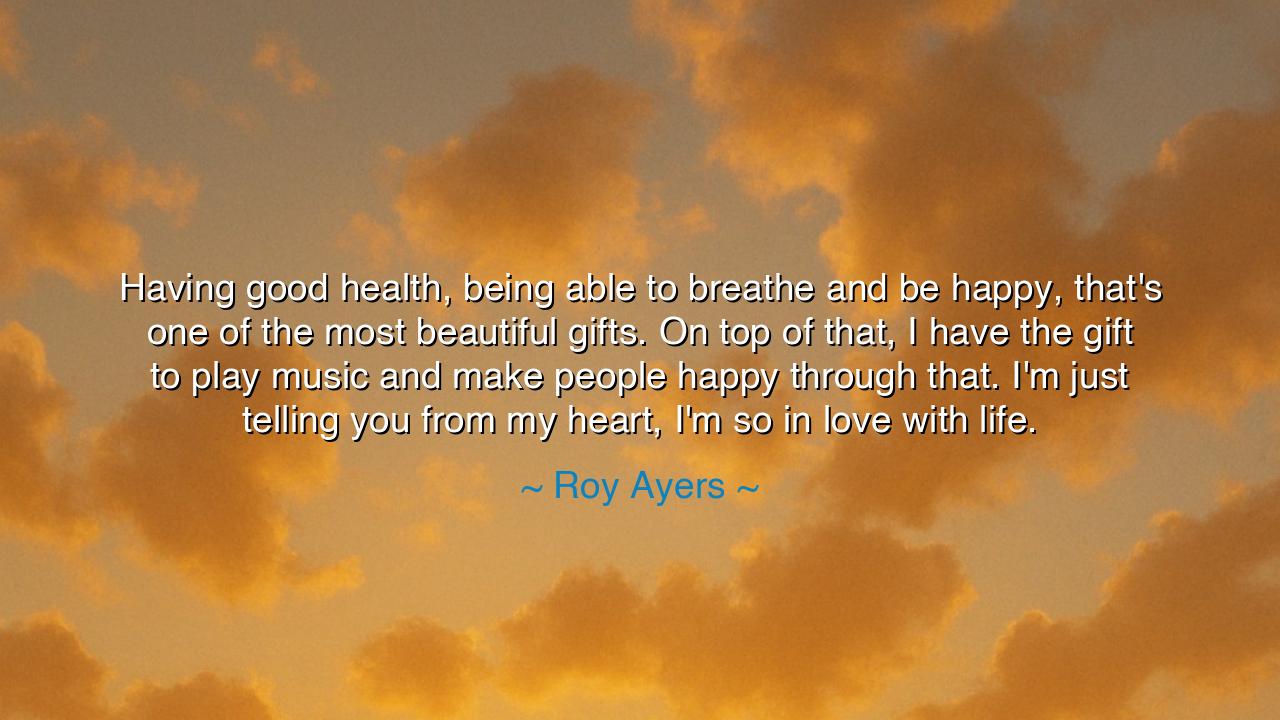
Having good health, being able to breathe and be happy, that's
Having good health, being able to breathe and be happy, that's one of the most beautiful gifts. On top of that, I have the gift to play music and make people happy through that. I'm just telling you from my heart, I'm so in love with life.






In the radiant words of Roy Ayers, master of rhythm and soul, we hear the song of a man who has looked upon life not as a burden to be endured, but as a wonder to be cherished. He said: “Having good health, being able to breathe and be happy, that's one of the most beautiful gifts. On top of that, I have the gift to play music and make people happy through that. I'm just telling you from my heart, I'm so in love with life.” In these words lies the gospel of gratitude, the wisdom of one who has tasted joy and sorrow alike, and found in both the melody of existence. Ayers speaks not as a philosopher of theory, but as a musician of the soul — one who has felt the divine harmony between breath, heart, and creation.
For the ancients taught that life itself is the first art, and every day lived with awareness is a masterpiece. Before one seeks wealth or power, before one strives for honor or fame, there is the primal gift: to breathe. To awaken and feel one’s lungs fill with air, to sense the pulse of life within one’s chest — this is the beginning of all gratitude. Ayers reminds us that this simple act, so often unnoticed, is the foundation upon which all other blessings stand. Those who forget to be thankful for breath will chase a thousand false treasures; those who remember it will find beauty even in the ordinary.
Ayers’ voice, steeped in the language of jazz, teaches us that joy is not an accident — it is a discipline. The world around us may waver with conflict, loss, or uncertainty, yet the heart can still choose harmony. When he says he is “so in love with life,” he is not denying life’s pain — he is embracing its entirety. The wise have long known that happiness is not found in the absence of struggle, but in the courage to sing despite it. So too did the ancient poet Orpheus, who, when cast into darkness, sang until even the stones wept with beauty. Ayers, in his way, is a modern Orpheus — his music not only soothes others but heals the one who creates it.
To be a musician is to translate the inexpressible — to take the unseen rhythm of existence and weave it into sound. When Ayers calls it a “gift,” he acknowledges that creativity is not born from possession, but from connection. The artist does not own his art; he channels it. And through that channel flows something divine. His joy in making people happy through music reflects the timeless truth that our greatest gifts are meant to be shared. Just as the sun does not hoard its light, nor the river its water, the artist who gives freely of his joy multiplies it in the hearts of others.
In his words also lies a lesson for those who live hurried lives — chasing endless desires yet forgetting the sanctity of the present. Ayers’ love of life arises not from what he owns, but from what he perceives: the miracle of health, of movement, of sound. It calls to mind the story of Beethoven, who, though deafened by fate, continued to compose music of such divine power that it transcended silence itself. Even when robbed of hearing, Beethoven wrote his Ninth Symphony — a hymn to joy. He could no longer hear the world, yet the song of life still thundered within him. That is the spirit Ayers carries — to love life so deeply that even hardship becomes rhythm, even silence becomes melody.
His words also remind us that gratitude transforms perception. The same world can appear barren to the ungrateful and radiant to the thankful. A healthy body, a deep breath, a moment of laughter — these are the foundations of abundance. In a world obsessed with achievement, Ayers brings us back to essence. He teaches that happiness is not found in having more, but in seeing more — in recognizing that life’s simplest moments are already miracles.
Thus, the lesson is clear: to live fully, one must cultivate gratitude, creativity, and love. Begin each morning as Ayers does — with thankfulness for the breath that greets you, for the chance to move, to create, to connect. Whatever your instrument — be it voice, craft, or kindness — play it well, and play it for others. Do not wait for perfection before you rejoice, for the act of rejoicing itself is perfection.
And so, children of the living world, remember the wisdom of Roy Ayers: to breathe is to receive the universe; to create is to return the gift. Let your days become a song, your actions a melody of kindness, your heart a rhythm of joy. For when you, too, can say, “I am so in love with life,” you will have discovered the truest art — not merely the art of music, but the art of living itself.






AAdministratorAdministrator
Welcome, honored guests. Please leave a comment, we will respond soon